|
The city's layout features concentric rings and radial expressways, designed to facilitate efficient traffic flow and provide easy access to different districts. Green spaces and parks, such as the Millennium Park, are integral to the plan, offering recreational areas and contributing to the city's aesthetic appeal. Residential areas are thoughtfully designed with varying densities, ranging from high-rise apartments in the central business district to more suburban layouts in the outer phases. The meticulous initial planning aimed to avoid the haphazard growth and infrastructural deficits that plagued Lagos, ensuring a more orderly and sustainable urban development.
Abuja's social profile is a melting pot of Nigeria's diverse ethnic groups, reflecting the pan-national vision upon which it was founded. Its population is highly educated and relatively affluent, particularly within the government and private sector elite. This demographic distinctiveness, however, also highlights significant social disparities. The planned nature of the city, coupled with the high cost of land and housing, often results in a stark contrast between the well-appointed core districts and the burgeoning informal settlements (known as "satellite towns" or "slums" by critics) that have sprung up on the city's periphery. These settlements cater to the lower-income population, including service workers, traders, and informal sector employees, who find the central city's cost of living prohibitive. Despite its meticulous planning, Abuja has faced significant challenges, primarily stemming from a population growth rate that far exceeded initial projections. Designed for 3 million by 2000, the current metro area population of Abuja in 2025 is 4,210,000. This explosive growth has put immense strain on existing infrastructure:
|
Abuja Profile |
Abuja Profile |
Abuja Profile | Abuja Profile |
For information, videos and photos of the West African nation of Nigeria, check out our Nigeria pages.
More >
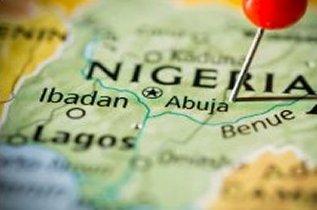 |

|
For visitors, Abuja offers a range of captivating tourist attractions. Central to its appeal is Aso Rock, the massive monolith that forms the city's backdrop and is visible from many vantage points, symbolising strength and stability. Below its gaze lies the Presidential Complex, a formidable structure. For relaxation and recreation, Millennium Park, designed by renowned architect Manfredi Nicoletti, provides a serene escape with its beautifully landscaped gardens, fountains, and walking paths – perfect for a leisurely stroll or family picnic. Jabi Lake, another popular spot, offers opportunities for horseback riding, boat rides, jet skiing, and lakeside dining, providing a refreshing contrast to the city's urban landscape. Julius Berger Waterfront Park is also worth a visit. Most tourists to Abjuba will spend some time visiting the 30-metre high Gurara Waterfalls which lie on the Gurara River along the Suleja-Minna Road whilst the more energetic may opt to climb the enimatic Zuma Rock (above, left) along the main road from Abuja to Kaduna off Madala (you can't miss it given it's 2,379 ft tall ~ twice as high as the Uluru Rock in Australia) which the Gwari people believe is a gateway to the after life while others believe it hides a vast underground lake that will flood the area of the rock is ever disturbed. Other attractions include the Abuja Wonderland and Park, just a few minutes' drive from the city centre and opposite the National Stadium, the city's shopping malls and generous nightlife.
Abuja's city life, while often described as more orderly and less chaotic than Lagos, is nonetheless dynamic and diverse. The city boasts modern infrastructure, wide tree-lined avenues, and a noticeably greener environment due to extensive landscaping. This planned layout contributes to a relatively smooth flow of traffic, enhancing the overall experience for residents and visitors alike. The culinary scene in Abuja is burgeoning, with a wide array of restaurants offering everything from authentic Nigerian cuisine to international dishes, catering to diverse palates. Shopping opportunities range from modern malls like Jabi Lake Mall to local markets, providing a mix of global brands and local goods. The city also hosts various events, conferences, and cultural gatherings, reflecting its role as a key hub for diplomacy and business in West Africa. The future of Abuja hinges on its ability to evolve beyond its initial role as purely an administrative capital into a truly sustainable, economically diversified, and inclusive metropolis. Strategies for achieving this include:
|
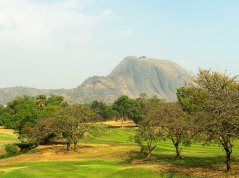 An ambitious master plan for Abuja was commissioned from the American firm International Planning Associates (IPA), drawing inspiration from other planned capitals like Brasília, Canberra, and Washington, D.C. This plan envisioned a modern, functional, and aesthetically pleasing city. Construction formally began in the early 1980s, marking the beginning of a monumental undertaking that would redefine Nigeria's urban landscape. On 12th December 1991, the newly built city of Abuja became Nigeria's official capital.
An ambitious master plan for Abuja was commissioned from the American firm International Planning Associates (IPA), drawing inspiration from other planned capitals like Brasília, Canberra, and Washington, D.C. This plan envisioned a modern, functional, and aesthetically pleasing city. Construction formally began in the early 1980s, marking the beginning of a monumental undertaking that would redefine Nigeria's urban landscape. On 12th December 1991, the newly built city of Abuja became Nigeria's official capital.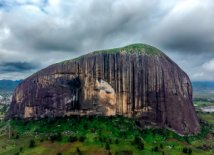 Abuja's economic profile is predominantly driven by its role as the seat of government. Public administration and services form the backbone of its economic activity, attracting civil servants, diplomats, and ancillary businesses that cater to the government sector. This has fostered a significant service industry, including hospitality, telecommunications, banking, and real estate, which has seen substantial growth over the past few decades. The presence of numerous international organisations, embassies, and non-governmental organisations also contributes significantly to the city's economic vitality and cosmopolitan character. However, the reliance on government spending has also created vulnerabilities. Economic diversification has been a continuous challenge, with efforts to attract more private sector investment and industrial activity proving slow. While real estate booms and high-end services thrive, the underlying productive base remains somewhat narrow compared to commercial hubs like Lagos.
Abuja's economic profile is predominantly driven by its role as the seat of government. Public administration and services form the backbone of its economic activity, attracting civil servants, diplomats, and ancillary businesses that cater to the government sector. This has fostered a significant service industry, including hospitality, telecommunications, banking, and real estate, which has seen substantial growth over the past few decades. The presence of numerous international organisations, embassies, and non-governmental organisations also contributes significantly to the city's economic vitality and cosmopolitan character. However, the reliance on government spending has also created vulnerabilities. Economic diversification has been a continuous challenge, with efforts to attract more private sector investment and industrial activity proving slow. While real estate booms and high-end services thrive, the underlying productive base remains somewhat narrow compared to commercial hubs like Lagos.


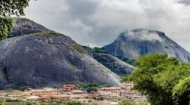
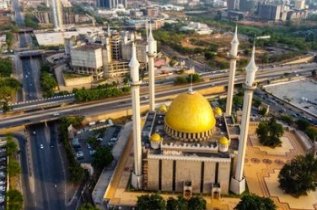 Cultural and architectural landmarks are also abundant. The magnificent National Mosque (left), built in 1984 and the impressive neo-gothic designed National Christian Centre stand as iconic symbols of religious harmony and architectural prowess. The National Library is equally impressive as is the Ministry of Defence building, which resembles a ship. For those interested in local crafts and souvenirs, the Abuja Arts and Crafts Village offers a vibrant market experience where visitors can explore and purchase traditional Nigerian artefacts, textiles, and artworks directly from local artisans.
Cultural and architectural landmarks are also abundant. The magnificent National Mosque (left), built in 1984 and the impressive neo-gothic designed National Christian Centre stand as iconic symbols of religious harmony and architectural prowess. The National Library is equally impressive as is the Ministry of Defence building, which resembles a ship. For those interested in local crafts and souvenirs, the Abuja Arts and Crafts Village offers a vibrant market experience where visitors can explore and purchase traditional Nigerian artefacts, textiles, and artworks directly from local artisans.


